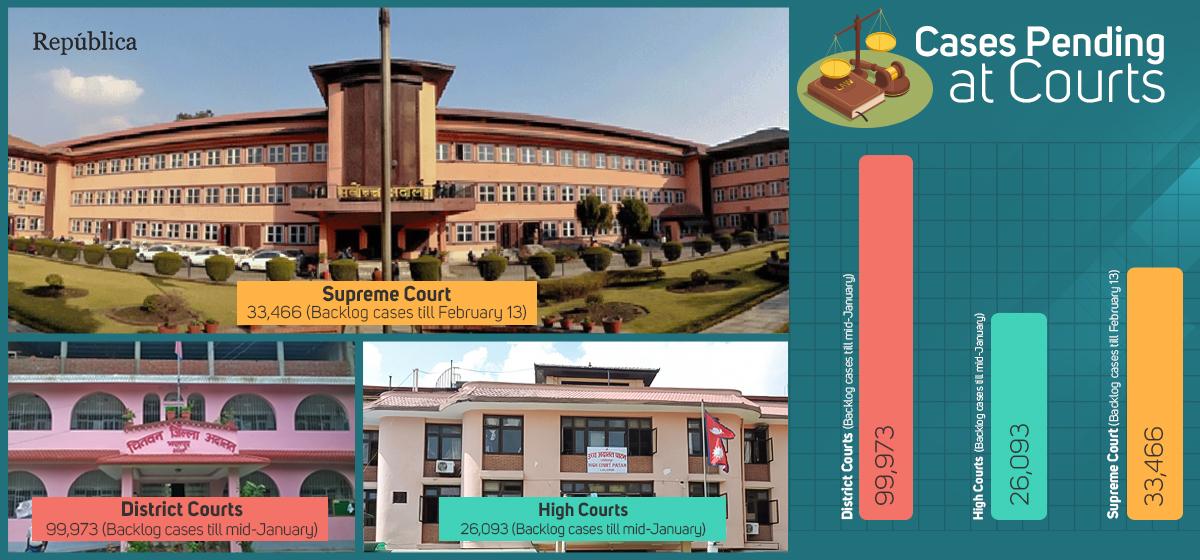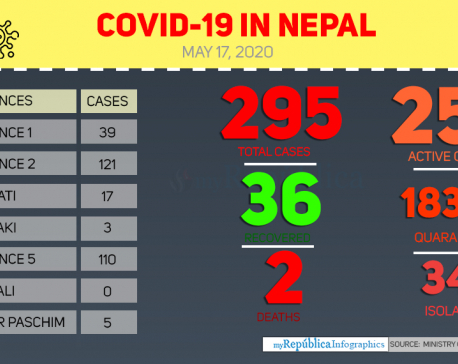
OR
News Analysis
The Injustice of Delayed Justice
Published On: March 7, 2022 07:31 PM NPT By: Kosh Raj Koirala | @KoshRKoirala

KATHMANDU, March 6: There is a popular legal maxim with a deeper meaning-- justice delayed is justice denied. The failure of the state apparatus to provide legal remedies to people who think they are facing injustice is considered one of the greatest weaknesses of the government.
However, this has been the norm rather than the exception in Nepal's judiciary. Thousands of cases, some dating back years, are pending in the three tiers of courts, leaving justice-seekers in the lurch for years, if not decades.
According to Supreme Court officials, the number of backlog cases at the district courts across the country stands at 99,973 as of mid-January. The number of pending cases in the seven high courts has reached 26,093 during the same period.
Worse still, the number of backlog cases in the country's apex court is much higher. As of February 13 this year, the number of cases that await settlement has reached over 33,000. As the rate of case settlement is painfully slow, it may actually take several more years to settle this backlog of cases.
Joint Registrar Baburam Dahal, who until recently served as the Spokesperson of the Supreme Court, said the COVID-19 pandemic had contributed to the increase in the number of backlog cases. "In case of the backlog cases at the Supreme Court, there is not enough human resource. Keeping in view the volume of cases, we had proposed to increase the number of justices at the Supreme Court to 27 during the constitution drafting process. However, the number was limited to 20," he says.
Officials at the SC also argue that the months-long agitation launched by the Nepal Bar Association (NBA) against Chief Justice Cholendra SJB Rana equally contributed to make things worse. "The COVID-19 pandemic had already left a serious impact on the functioning of the courts, the refusal of SC justices to conduct hearings for weeks only made things worse," a senior official at the SC told Republica.
Although officials argue that the lack of adequate manpower and the COVID-19 pandemic are largely to be blamed for this situation, experts are not ready to buy these arguments.
Advocate Om Prakash Aryal argues that COVID-19 could just be an excuse as a similarly large number of backlog cases were recorded even in the pre-COVID-19 years. "I do not think there is a shortage of human resources at the courts either. In fact, there are more than enough required human resources in all three tiers of court. But there are a number of inherent problems in the judiciary that have created such a situation," says advocate Aryal.
Procedure-centric justice delivery system
Experts argue that the major reason behind the huge number of backlog cases is the procedure-centric justice delivery system in Nepal. "It is very important to shorten the procedures of settling cases. In many cases, justices often issue unnecessary orders just to buy time. The time of hearing should be increased," argues senior advocate Dinesh Tripathi.
Experts say that the number of justices at the district courts and high courts is more than enough to settle the cases they have at the moment. Even in the case of backlog cases that are with the Supreme Court, the problem can be greatly addressed if justices use all their office hours for conducting hearings.
"Cause lists are generally published at 10:30AM and the bench starts hearing at noon. In many cases, hearings are put off for another date after 2:30PM. How can we settle such a large number of backlog cases this way?" asks Tripathi.
Advocate Aryal believes that lack of professional competence among high court judges is another contributing factor behind such a large number of backlog cases. "There are a large number of judges appointed under a political quota. They are not ready to properly comprehend the cases in the first place. Even if they settle the cases, most justice-seekers are not convinced with their decisions and decide to knock on the doors of the Supreme Court again," he says.
Corruption plays foul while media trials harm
Insiders of Nepal's judiciary allege that a large number of cases are put on hold for an extended period as justices or judges themselves are involved in unscrupulous financial dealings through middlemen. They argue that justices are often found lingering over the cases in an apparent bid to meet their own vested interests.
"I would say the most important thing is corruption. When the settlement of cases is prolonged for no valid reasons, this paves the way for justices to become involved in corruption. There are cases in which justices delay settlement of cases in order to meet their vested interests," advocate Aryal further says.
While corruption is one aspect of the problem, experts say justices often shy away from settling the cases that have drawn huge media attention for obvious reasons. They have a fear of courting controversy, thus blighting the prospects of their own professional careers. "You have a fear of courting unnecessary controversy even if you pass a verdict that is based on objective facts or evidence. These kinds of considerations also cause a huge number of backlog cases," says a retired High Court judge, asking not to be named.
Reforms a must
While the Supreme Court has already initiated a strategic plan to increase the rate of case settlements and reduce the backlog cases, there is little chance for the backlog cases to be settled anytime soon. Court insiders argue that this is possible only when both court administration and lawyers are able to ensure closer cooperation.
Advocate Aryal believes that judges need to ensure proper management of time along with the utilization of all office hours for conducting hearings. "Some of the cases pending at the court are only cases for the sake of cases. They need to be settled at the earliest," he adds. "We need to make the high courts more effective so that most cases are settled at the level of the high court itself."
Experts also believe that it is high time that the government introduced comprehensive judicial reforms. "I think the issue of backlog cases at the Supreme Court will be largely addressed if all justices devoted all their office time to settling the cases. In case of the backlog cases at the lower level courts, the apex court needs to ensure effective monitoring and evaluation of judges at the high courts and district court and make them fully accountable to their duty," argues Tripathi.
You May Like This

Health ministry confirms three new COVID-19 cases, number of total cases reaches 295
KATHMANDU, May 17: Nepal reported three new cases of COVID-19 on Sunday evening, taking the national tally to 295. ... Read More...

Outreach Nepal lifts Nepal Ice AAN Futsal
KATHMANDU, May 13: Outreach Nepal has lifted the first ever Nepal Ice AAN Futsal Tournament 2018 defeating Media Basket by a... Read More...

AI Nepal calls on government to follow court order regarding Adhikari's murder
POKHARA, Sept 12: Amnesty International (AI) Nepal has passed a special proposal, calling on the government to abide by the... Read More...




Just In
- Tattva Farms rejuvenates Nepali kitchens with flavored jaggery
- Evidence-Based Policy Making in Nepal: Challenges and the Way Forward
- Insurers stop settling insurance claims after they fail to get subsidies from government
- Nepal-Qatar Relations: Prioritize promoting interests of Nepali migrant workers
- Health ministry to conduct ‘search and vaccinate’ campaign on May 13
- Indian customs releases trucks carrying Nepali tea, halted across Kakarbhitta
- Silent period for by-election to begin from midnight
- SC issues short-term interim order to govt and TU not to take immediate action against TU legal advisor Khanal













Leave A Comment